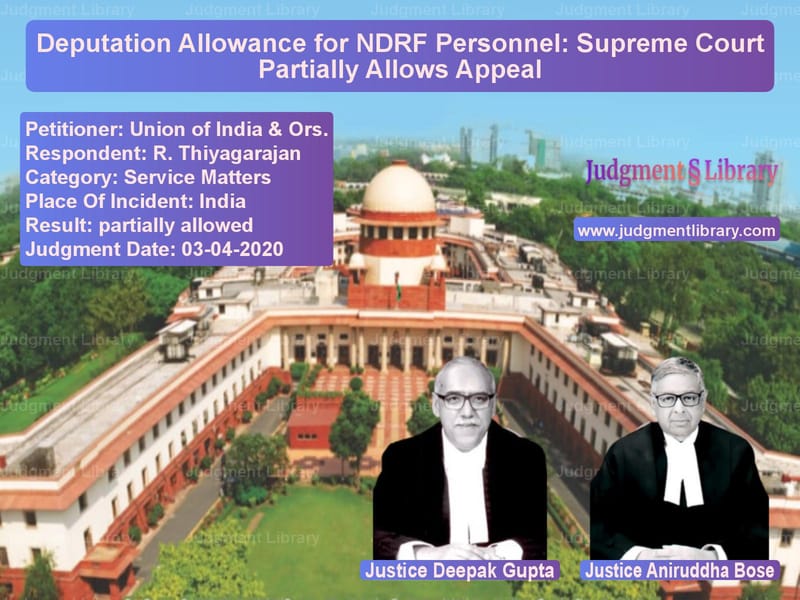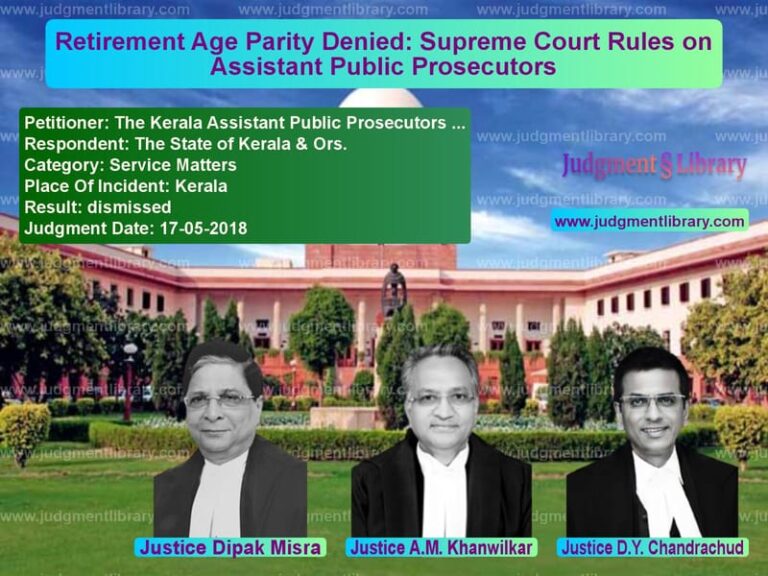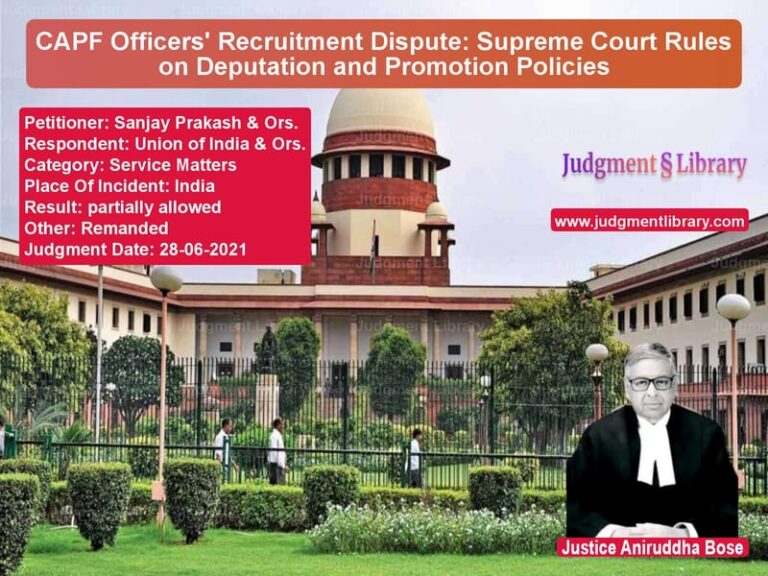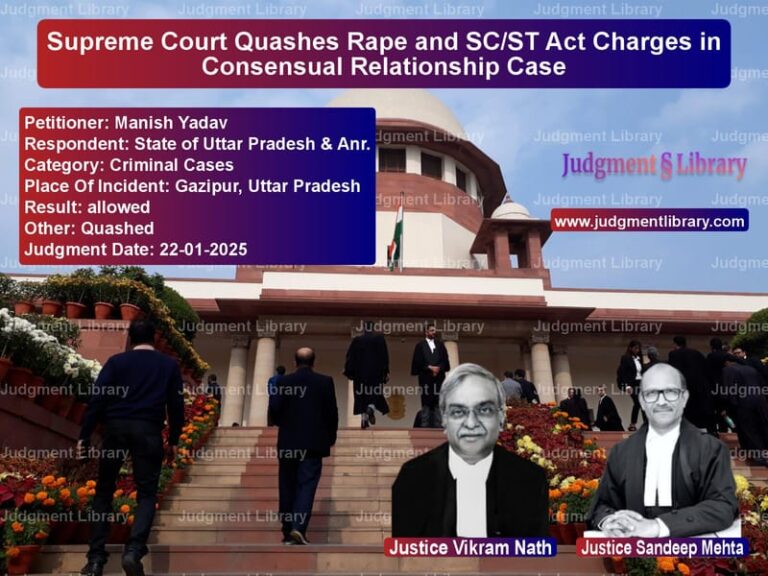Deputation Allowance for NDRF Personnel: Supreme Court Partially Allows Appeal
The case of Union of India & Ors. vs. R. Thiyagarajan concerned the entitlement of a Central Industrial Security Force (CISF) employee to deputation allowance while serving in the National Disaster Response Force (NDRF). The Supreme Court examined the legal aspects of deputation and ruled that the respondent was eligible for deputation allowance but only from the date when the NDRF gained full administrative control over the personnel.
Background of the Case
The respondent, R. Thiyagarajan, was recruited as a constable in CISF in 1999. Following the enactment of the Disaster Management Act, 2005, the government created the NDRF for disaster response operations. Initially, NDRF battalions were formed by drawing personnel from various Central Para Military Forces (CPMF), including CISF, BSF, CRPF, and ITBP. These personnel continued to receive their pay and allowances from their parent forces and remained under their administrative control.
However, with the enforcement of the Disaster Management (National Disaster Response Force) Rules, 2008, on 11.09.2009, the battalions were officially designated as NDRF units and placed under its exclusive command. The respondent was deployed to NDRF on 18.04.2008 and later repatriated to CISF on 07.10.2011. He filed a representation seeking 10% deputation allowance and 25% special allowance from the date of his deputation.
Petitioner’s Arguments (Union of India & Ors.)
- The government contended that personnel deployed to NDRF before 11.09.2009 were not on deputation, as they remained under the control of their parent organizations.
- They argued that the Ministry of Home Affairs had sanctioned deputation allowance from 14.01.2013, and payment could not be backdated.
- It was emphasized that deputation requires a formal change in the employer, which did not happen until the NDRF assumed command in 2009.
- The government also challenged the Madras High Court’s ruling, which extended the benefit to all similarly situated personnel, arguing that the High Court lacked jurisdiction to make such a sweeping order.
Respondent’s Arguments (R. Thiyagarajan)
- The respondent relied on the Delhi High Court’s ruling in Brij Bhushan vs. Union of India, which held that NDRF personnel were on deputation from the date they joined.
- He asserted that the Disaster Management Act and NDRF Rules deemed his deployment as deputation, making him eligible for allowances from 18.04.2008.
- He argued that delaying the allowance until 2013 was arbitrary and unfair to those who had served in disaster-prone areas under NDRF.
Supreme Court’s Observations
The Supreme Court examined the concept of deputation and emphasized that it involves:
- Assignment of an employee to another organization or department.
- A change in administrative control and financial responsibility.
- The consent of the employee and the parent organization.
The Court noted that until 11.09.2009, NDRF personnel continued to be under the command of their parent organizations and received their salaries from them. It ruled that:
- Personnel could not be considered on deputation before 11.09.2009, as there was no change in administrative control.
- Deputation allowance should be paid only from 11.09.2009 to 07.10.2011 (the respondent’s tenure in NDRF).
- The Madras High Court exceeded its jurisdiction by directing payment to all affected personnel, as it lacked authority over national policies.
The Court stated, “Up to 10.09.2009, the respondent could not be said to be on deputation even though as per the Rules he may have been described as a deputationist. However, on 11.09.2009, when the Ministry of Home Affairs conferred the command and control of the Battalions with the Director General, NDRF, personnel would be deemed to be on deputation with the NDRF.”
Final Judgment
The Supreme Court partially allowed the appeal:
- The respondent was entitled to deputation allowance but only for the period from 11.09.2009 to 07.10.2011.
- The Madras High Court’s directive to extend benefits to all NDRF personnel was set aside.
- The Delhi High Court was asked to decide the fate of other pending cases based on this judgment.
Implications of the Judgment
The ruling clarified that deputation requires a formal transfer of control and financial liability. It also limited the retrospective application of deputation allowance and reinforced the principle that High Courts cannot issue orders with nationwide implications beyond their jurisdiction.
Petitioner Name: Union of India & Ors..Respondent Name: R. Thiyagarajan.Judgment By: Justice Deepak Gupta, Justice Aniruddha Bose.Place Of Incident: India.Judgment Date: 03-04-2020.
Don’t miss out on the full details! Download the complete judgment in PDF format below and gain valuable insights instantly!
Download Judgment: Union of India & Ors vs R. Thiyagarajan Supreme Court of India Judgment Dated 03-04-2020.pdf
Direct Downlaod Judgment: Direct downlaod this Judgment
See all petitions in Public Sector Employees
See all petitions in Employment Disputes
See all petitions in Recruitment Policies
See all petitions in Judgment by Deepak Gupta
See all petitions in Judgment by Aniruddha Bose
See all petitions in partially allowed
See all petitions in supreme court of India judgments April 2020
See all petitions in 2020 judgments
See all posts in Service Matters Category
See all allowed petitions in Service Matters Category
See all Dismissed petitions in Service Matters Category
See all partially allowed petitions in Service Matters Category







